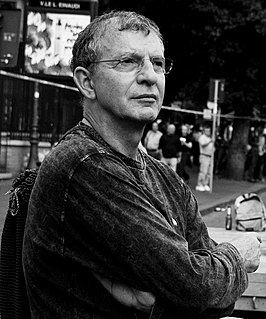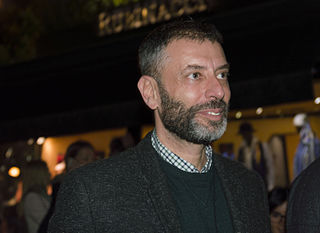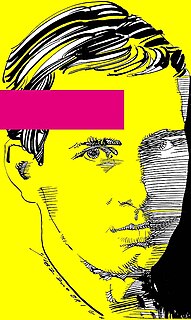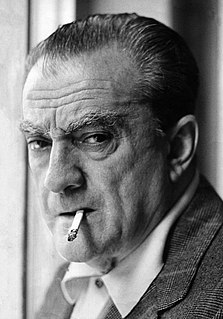 W
WSibilla Aleramo was an Italian feminist writer and poet best known for her autobiographical depictions of life as a woman in late 19th century Italy.
 W
WCount Francesco Algarotti was a Venetian polymath, philosopher, poet, essayist, anglophile, art critic and art collector. He was a man of broad knowledge, an expert in Newtonianism, architecture and opera. He was a friend of Frederick the Great and leading authors of his times: Voltaire, Jean-Baptiste de Boyer, Marquis d'Argens, Pierre-Louis de Maupertuis and the atheist Julien Offray de La Mettrie. Lord Chesterfield, Thomas Gray, George Lyttelton, Thomas Hollis, Metastasio, Benedict XIV and Heinrich von Brühl were among his correspondents.
 W
WPietro Aretino was an Italian author, playwright, poet, satirist and blackmailer, who wielded influence on contemporary art and politics. He was one of the most influential writers of his time and an outspoken critic of the powerful.
 W
WDario Bellezza was an Italian poet, author and playwright. He won the Viareggio, Gatto, and Montale prizes.
 W
WAldo Busi is a contemporary Italian writer and translator, famous for his linguistic invention and for his polemic force as well as for some prestigious translations from English, German and ancient Italian that include Johann Wolfgang Goethe, Lewis Carroll, Christina Stead, Giovanni Boccaccio, Baldesar Castiglione, Friedrich Schiller, Joe Ackerley, John Ashbery, Heimito von Doderer, Ruzante, Meg Wolitzer, Paul Bailey, Nathaniel Hawthorne.
 W
WGiovanni Comisso was an important Italian writer of the twentieth century, appreciated by Eugenio Montale, Umberto Saba, Gianfranco Contini and many others. In Treviso, during his adolescence, he met and got to know the sculptor Arturo Martini who introduced him to the writings of Arthur Rimbaud and Friedrich Nietzsche. In 1915, he enlisted in the telegraph Corps of Engineers and participated in the Great War. Together with Gabriele d’Annunzio, he took part in the Fiume enterprise (1919-1920), an experience that would be fundamental to his development as a writer. The following years were years of travel, both along the Adriatic aboard a sailing ship with the sailors of Chioggia, and in Europe and North Africa on behalf of a number of important newspapers. He lived for long periods in Paris, between 1927 and 1928, with his friend the painter Filippo De Pisis. The following year, in 1929, as a special correspondent for the "Corriere della Sera", he completed the Grand Tour in the Far East visiting China, Japan and Russia from Siberia to Moscow. After much wandering he wanted to take root in the Veneto countryside and with the proceeds of the articles, on his return, he bought a house and fields in Zero Branco, a town in the Treviso area, while continuing to travel along Italy as a special correspondent for several newspapers. Here he experienced intense periods of writing and friendship and later learned of the bombing of Treviso, where the family home was destroyed. He closed the house in Zero Branco to return to live in Treviso only in 1954 after his mother's death. In his later years he continued to write and publish short stories and novels, in which there are detailed descriptions of despair, disappointments, anxieties and dislikes together with many ironic and bitter descriptions of man’s failings. "Our life today is reduced to these extremes from which serenity, beauty and harmony are excluded.” He died in hospital on January 21, 1969
 W
WMassimo Consoli was known as "the father of the Italian gay movement". Besides being an activist, he was also an anarchist and an historian. In 1998, the State Archive of Italy's Ministry of Culture acquired his extensive archive of Italian gay activist history.
 W
WIvan Cotroneo is an Italian writer, scriptwriter and director, known for I Am Love, Kryptonite! and Loose Cannons.
 W
WGustav Hofer is an Italian film director, screenwriter, journalist and TV host.
 W
WFerzan Özpetek is a Turkish-Italian film director and screenwriter, residing in Italy.
 W
WPier Paolo Pasolini was an Italian film director, poet, writer, and intellectual, who also distinguished himself as an actor, journalist, novelist, playwright, and political figure. He remains a controversial personality in Italy due to his blunt style and the focus of some of his works on taboo sexual matters. He was an established major figure in European literature and cinematic arts. His murder prompted an outcry in Italy and its circumstances continue to be a matter of heated debate.
 W
WLina Poletti, was an Italian writer, poet, playwright, and feminist. Often described as beautiful and rebellious, she was prone to wear men's clothing and is considered one of the first women in Italy to openly declare her lesbianism.
 W
WAgnolo (Angelo) Ambrogini, commonly known by his nickname Poliziano, was an Italian classical scholar and poet of the Florentine Renaissance. His scholarship was instrumental in the divergence of Renaissance Latin from medieval norms and for developments in philology. His nickname, Poliziano, by which he is chiefly identified to the present day, was derived from the Latin name of his birthplace, Montepulciano.
 W
WLuca Ragazzi is an Italian film director, screenwriter, journalist and actor.
 W
WLuigi Settembrini was an Italian man of letters and politician.
 W
WTommaso Sgricci was an Italian poet and actor, hugely admired in his time for his talent in improvisation.
 W
WTorquato Tasso was an Italian poet of the 16th century, best known for his poem Gerusalemme liberata, in which he depicts a highly imaginative version of the combats between Christians and Muslims at the end of the First Crusade, during the Siege of Jerusalem. Tasso suffered from mental illness and died a few days before he was due to be crowned on the Capitoline Hill as the king of poets by the Pope. His work was widely translated and adapted, and until the beginning of the 20th century, he remained one of the most widely read poets in Europe.
 W
WGiovanni Testori was an Italian writer, playwright, art historian and literary critic. His literary works are characterised by linguistic experimentalism, featuring both lexicon and syntax that mix and fuse elements of the Lombard dialect with French and English. Religion is present in his oeuvre as a tragic tension to transcendence, marked by doubt, blasphemy and repentance. In 1972 he founded with Franco Parenti, Andrée Ruth Shammah, Dante Isella and Gian Maurizio Fercioni the theatreIl Salone Pier Lombardo, next called Franco Parenti Theatre.
 W
WPier Vittorio Tondelli was an Italian writer who wrote a small but influential body of work. He was born in Correggio, a small town in the Emilia-Romagna region in Italy and died in nearby Reggio Emilia because of AIDS. Tondelli enjoyed modest success as a writer but often encountered trouble with censors for his use of homosexual themes in his works. Tondelli was buried in a small cemetery in the hamlet of Canolo, just outside Correggio.
 W
WBenedetto Varchi was an Italian humanist, a historian and poet.
 W
WLuchino Visconti di Modrone, Count of Lonate Pozzolo, was an Italian theatre, opera and cinema director, as well as a screenwriter. Visconti was one of the fathers of Italian neorealism in film, but later moved towards luxurious-looking films obsessed with beauty, death and European history – especially the decay of aristocracy. Among his best-known films are Ossessione (1943), Senso (1954), Rocco and His Brothers (1960), The Leopard (1963), The Damned (1969), Death in Venice (1971) and Ludwig (1972).